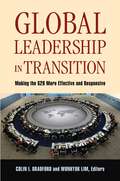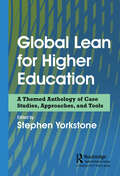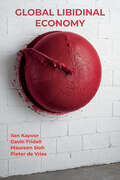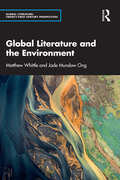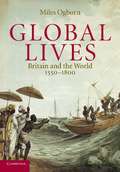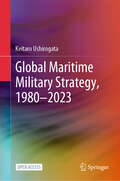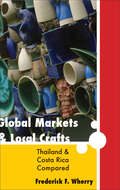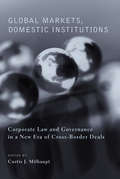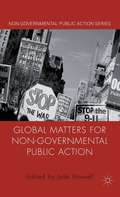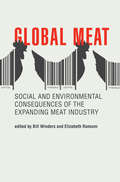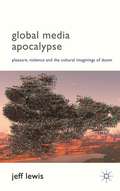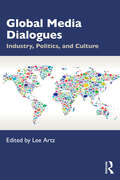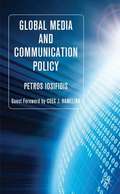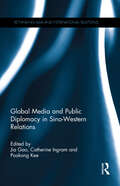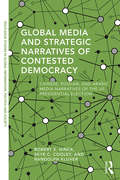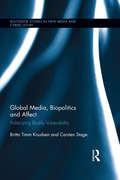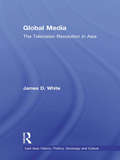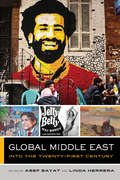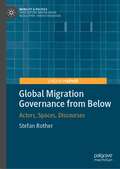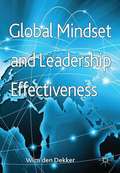- Table View
- List View
Global Leadership in Transition
by Wonhyuk Lim Colin I. BradfordGlobal Leadership in Transition calls for innovations that would "institutionalize" or consolidate the G20, helping to make it the global economy's steering committee. The emergence of the G20 as the world's premier forum for international economic cooperation presents an opportunity to improve economic summitry and make global leadership more responsive and effective, a major improvement over the G8 era."Key contributors to this volume were well ahead of their time in advocating summit meetings of G20 leaders. In this book, they now offer a rich smorgasbord of creative ideas for transforming the G20 from a crisis-management committee to a steering group for the international system that deserves the attention of those who wish to shape the future of global governance."-C. Randall Henning, American University and the Peterson InstituteContributors: Alan Beattie, Financial Times; Thomas Bernes, Centre for International Governance Innovation (CIGI); Sergio Bitar, former Chilean minister of public works; Paul Blustein, Brookings Institution and CIGI; Barry Carin, CIGI and University of Victoria; Andrew F. Cooper, CIGI and University of Waterloo; Kemal Dervis, Brookings; Paul Heinbecker, CIGI and Laurier University Centre for Global Relations; Oh-Seok Hyun, Korea Development Institute (KDI); Jomo Kwame Sundaram, United Nations; Homi Kharas, Brookings; Hyeon Wook Kim, KDI; Sungmin Kim, Bank of Korea; John Kirton, University of Toronto; Johannes Linn, Brookings and Emerging Markets Forum; Pedro Malan, Itau Unibanco; Thomas Mann, Brookings; Paul Martin, former prime minister of Canada; Simon Maxwell, Overseas Development Institute and Climate and Development Knowledge Network; Jacques Mistral, Institut Français des Relations Internationales; Victor Murinde, University of Birmingham (UK); Pier Carlo Padoan, OECD Paris; Yung Chul Park, Korea University; Stewart Patrick, Council on Foreign Relations; Il SaKong, Presidential Committee for the G20 Summit; Wendy R. Sherman, Albright Stonebridge Group; Gordon Smith, Centre for Global Studies and CIGI; Bruce Stokes, German Marshall Fund; Ngaire Woods, Oxford Blavatnik School of Government; Lan Xue, Tsinghua University (Beijing); Yanbing Zhang, Tsinghua University.
Global Lean for Higher Education: A Themed Anthology of Case Studies, Approaches, and Tools
by Stephen YorkstoneHigher education (HE) is amongst the hardest sectors in which to apply lean. Universities resist change, their organizational cultures being far from the manufacturing environment where lean was born. The way HE organizations are structured, funded, and function globally is idiosyncratic; one size is unlikely to fit all. However, the sector is also dynamic and a mature understanding of lean, as a philosophy, led by principles, suggests there are many ways HE could grow through lean. This collection of work reflects the state-of-the-art in the global practical application of lean for higher education. It aims to demonstrate the diverse applications of lean in universities inspiring others to deeply engage with lean thinking in their own unique context and to drive successful, sustainable, lean work. Contributors are both well-known experts in lean HE and up-and-coming practitioners. Authors live globally, in countries such as Australia, Canada, Malaysia, Poland, the UK, and the USA. They represent higher education environments from applied teaching institutions to research-focused universities from 50 years old to more than 800 years old. The collection focuses on lean applied across universities as a whole, often addressing the administrative support or professional services side of how these institutions work. The application of lean is not limited purely to the administration of such organizations but is applied to the primary purpose of universities: teaching and research. This volume is not focused on lean theory. Instead, it discusses how HE institutions have taken lean forward and the lessons learned that others can share and learn from. It is composed of six sections: Starting out, People, Projects, Technology, Sustaining Lean, and Culture. The rich and wide perspectives in this book will enable the reader to understand the many ways that lean thinking is applied in higher education globally. More importantly, this book will help the reader better understand and apply lean in the context of their own work.
Global Libidinal Economy
by Gavin Fridell Ilan Kapoor Maureen Sioh Pieter de VriesThis is the first book to examine global political economy from a psychoanalytic perspective. It claims that the libidinal—the site of unconscious desire—plays not a supplementary or trivial, but a constitutive role in global political economy. Consumption, for example, is not simply a way of satisfying a material or biological need but a doomed attempt at soothing our deeply held sense of loss; and capital is not just a means to material growth and prosperity but is invested with "drive" that seduces, beguiles, and manipulates in the service of unending accumulation. Thus, in contrast to political economy, which assumes a rational subject, libidinal economy is founded on the notion of a desiring subject, who obeys a logic not of good sense or self-interest but profligacy and irrationality. By applying a psychoanalytic lens, Global Libidinal Economy thereby seeks to uncover the unconscious excesses and antagonisms emergent in such key political economy categories as "production," "trade," and "ecology," while also bringing out significant contemporary themes relating to "gender" and "race."
Global Literature and the Environment (Global Literature)
by Matthew Whittle Jade Munslow OngGlobal Literature and the Environment analyses literatures from across the world that connect readers to the localized impacts of the climate and ecological emergencies. The book contextualizes ecological breakdown within the history of imperialist-capitalism, exploring how literature helps us to imagine and create a habitable and just world for all forms of life.The four chapters are organised according to the elements of the climate system that are at risk. ‘Earth’ examines Caribbean, American, South African, and British literatures that explore how dominant human groups have exploited soils, minerals, metals, and oil in pursuit of economic aims. ‘Water’ engages with poetic representations of, and responses to, extraction, pollution, and global warming in the fresh- and saltwaters of Nigeria and the icescapes of Alaska. ‘Air’ analyses prose and poetry that depicts atmospheric pollution caused by gas flaring in the Niger Delta and the production of pesticides in India. ‘Life’ attends to the ways in which literature contextualizes the drivers of, and proposed solutions to, mass species extinction across North America, Africa, Australasia, and Aotearoa New Zealand.This accessible and engaging book explores novels, plays and poetry by writers including Octavia Butler, C.L.R. James, dg nanouk okpik, Ken Saro-Wiwa, Imbolo Mbue, Indra Sinha, Witi Ihimaera, J.M. Coetzee, and Henrietta Rose-Innes, amongst many others. It introduces readers to the concept of the Anthropocene alongside perspectives that challenge the assumption that the climate crisis is caused by an undifferentiated humanity. In doing so, the book draws on, and combines, a range of theoretical approaches, including postcolonialism, Indigenous studies, ecocriticism, cultural materialism, and animal studies.
Global Lives: Britain and the World, 1550-1800
by Miles OgbornThis is a fascinating and unique account of Britain's rise as a global imperial power told through the lives of over forty individuals from a huge range of backgrounds. Miles Ogborn relates and connects the stories of monarchs and merchants, planters and pirates, slaves and sailors, captives and captains, reactionaries and revolutionaries, artists and abolitionists from all corners of the globe. These dramatic stories give new life to the exploration of the history and geography of changing global relationships, including settlement in North America, the East India Company's trade and empire, transatlantic trade, the slave trade, the rise and fall of piracy, and scientific voyaging in the Pacific. Through these many biographies, including those of Anne Bonny, Captain Cook, Queen Elizabeth I, Pocahontas, and Walter Ralegh, early modern globalisation is presented as something through which different people lived in dramatically contrasting ways, but in which everyone played a part.
Global Maritime Military Strategy, 1980–2023
by Keitaro UshirogataThis open access book is an ambitious study about how to use comparative methods to analyze contemporary military strategy in the maritime domain. Based on the three strategic concepts of area denial, sea control and power projection, this book analyzes the intensive conventional capabilities of six major powers’ military strategies. These include the United States, the United Kingdom and Japan, the so-called ‘sea powers,’ and Russia, China and India, which are usually recognized as ‘land-powers.’Through the analysis, this book aims to accomplish the following three main objectives: 1. To reconsider the basic concepts of maritime military strategic studies, which have not changed for almost one hundred years, and to propose a new analytical framework based on the following three elements—as well as verifying the appropriateness of this framework. a. The capability with which a country can deny military threat against its territory through the maritime domain within the geographic theater, i.e., roughly one thousand to two thousand kilometers from its coastline (area denial). b. The capability with which a country can obtain military superiority or disrupt an adversary’s military superiority in the open ocean (sea control). c. The capability with which a country can project military power from the maritime domain to other countries’ territories, accomplishing military strategic objectives (power projection). 2. To verify the six major powers’ long-term military strategic objectives, for example, whether the country aims to enhance its power in the maritime domain, or to project its military power to the other countries/areas beyond the maritime domain; to do this by analyzing each country’s force building directions. In addition, this book assesses each country’s capability for high-intensive conflict and unravels each security/military strategic objectives.3. By examining the strategic objectives of major powers, this book may contribute to establishing Japan’s future defense strategy.
Global Markets and Government Regulation in Telecommunications
by Kirsten Rodine-HardyIn recent years, liberalization, privatization, and deregulation have become commonplace in sectors once dominated by government-owned monopolies. In telecommunications, for example, during the 1990s, more than 129 countries established independent regulatory agencies and more than 100 countries privatized the state-owned telecom operator. Why did so many countries liberalize in such a short period of time? For example, why did both Denmark and Burundi, nations different along so many relevant dimensions, liberalize their telecom sectors around the same time? Kirsten L. Rodine-Hardy argues that international organizations - not national governments or market forces - are the primary drivers of policy convergence in the important arena of telecommunications regulation: they create and shape preferences for reform and provide forums for expert discussions and the emergence of policy standards. Yet she also shows that international convergence leaves room for substantial variation among countries, using both econometric analysis and controlled case comparisons of eight European countries.
Global Markets and Local Crafts: Thailand and Costa Rica Compared (Themes in Global Social Change)
by Frederick F. WherryToday it is not uncommon to find items in department stores that are hand-crafted in countries like Thailand and Costa Rica. These "traditional" crafts now make up an important part of a global market. They support local and sometimes national economies and help create and solidify cultural identity. But these crafts are not necessarily indigenous. Whereas Thailand markets crafts with a long history and cultural legacy, Costa Rica has created a local handicraft tradition where none was known to exist previously.In Global Markets and Local Crafts, Frederick F. Wherry compares the handicraft industries of Thailand and Costa Rica to show how local cultural industries break into global markets and, conversely, how global markets affect the ways in which artisans understand, adapt, and utilize their cultural traditions. Wherry develops a new framework for studying globalization by considering the phenomenon from the perspective of the supplier instead of the market. Drawing from interviews and extensive fieldwork shadowing artisans and exporters in their daily dealings, Wherry offers a rare account of globalization in motion—and what happens when market negotiations do not proceed as planned. Considering economic and political forces, flows of people and materials, and frames that define cultural and market situations as they play out in the artisan communities of these two countries, Wherry uncovers how authentic folk tradition is capitalized or created.
Global Markets, Domestic Institutions: Corporate Law and Governance in a New Era of Cross-Border Deals
by Ed. Curtis J. MilhauptMarkets for capital, products, and managerial talent are expanding rapidly across national borders, yet domestic laws and practices have never had greater impact on corporate structures and cross-border deals. Investors pursuing high returns and diversification, entrepreneurs seeking capital, and managers endeavoring to restructure troubled enterprises now routinely face transaction counter-parties who operate within different legal and political systems, and who rank social priorities quite differently. This dynamic tension between global markets and domestic institutions fuels the debate on corporate governance reform now raging in virtually every region of the world. It also frames the intellectual agenda of the distinguished contributors to this volume, who examine such issues as the possible convergence of corporate governance practices around the world, national variations in the quality of corporate law, and the fiduciary responsibilities corporate managers around the world owe to their shareholders. Among the book's many insights is the contention that "globalization" and "global markets" are misleading terms, because they mask the local quality of much of the activity occurring within those rubrics. Case studies focus on France, Germany, Italy, Japan, Korea, Taiwan, and the transition economies of Eastern Europe.
Global Markets, Domestic Institutions: Corporate Law and Governance in a New Era of Cross-Border Deals
by Curtis J. MilhauptMarkets for capital, products, and managerial talent are expanding rapidly across national borders, yet domestic laws and practices have never had greater impact on corporate structures and cross-border deals. The distinguished contributors to this volume examine such issues as the possible convergence of corporate governance practices around the world, national variations in the quality of corporate law, and the fiduciary responsibilities corporate managers around the world owe to their shareholders. Case studies focus on France, Germany, Italy, Korea, Taiwan, and the transition economies of Eastern Europe.
Global Matters for Non-Governmental Public Action
by Jude HowellIn times of global crisis, or in the wake of disaster, non-governmental public actors play key roles in assisting states and providing relief. They also have crucial roles in advocating for changes: in societies, in laws and even to regimes. This unique collection of comparative studies on the politics of non-governmental public action at the global level explores themes such as child rights, access to medicine, global security and environmentalism. The contributors investigate how non-governmental public actors engage in global policy processes and how this in turn affects their activities and their relations with each other. They discuss the tensions of organising globally, revolving around different political agendas in the 'North' and 'South', different ideological starting-points and differential access to resources and opportunities. While non-governmental public action at the global level can make a difference to issues and policies both globally and domestically, acting globally also brings with it tensions, contradictions and complex power relations that shape how non-governmental public action unfolds.
Global Meat: Social and Environmental Consequences of the Expanding Meat Industry (Food, Health, and the Environment)
by Bill Winders Elizabeth RansomThe growth of the global meat industry and the implications for climate change, food insecurity, workers' rights, the treatment of animals, and other issues.Global meat production and consumption have risen sharply and steadily over the past five decades, with per capita meat consumption almost doubling since 1960. The expanding global meat industry, meanwhile, driven by new trade policies and fueled by government subsidies, is dominated by just a few corporate giants. Industrial farming—the intensive production of animals and fish—has spread across the globe. Millions of acres of land are now used for pastures, feed crops, and animal waste reservoirs. Drawing on concrete examples, the contributors to Global Meat explore the implications of the rise of a global meat industry for a range of social and environmental issues, including climate change, clean water supplies, hunger, workers' rights, and the treatment of animals.Three themes emerge from their discussions: the role of government and corporations in shaping the structure of the global meat industry; the paradox of simultaneous rising meat production and greater food insecurity; and the industry's contribution to social and environmental injustice. Contributors address such specific topics as the dramatic increase in pork production and consumption in China; land management by small-scale cattle farmers in the Amazon; the effect on the climate of rising greenhouse gas emissions from cattle raised for meat; and the tensions between economic development and animal welfare.ContributorsConner Bailey, Robert M. Chiles, Celize Christy, Riva C. H. Denny, Carrie Freshour, Philip H. Howard, Elizabeth Ransom, Tom Rudel, Mindi Schneider, Nhuong Tran, Bill Winders
Global Media Apocalypse
by Jeff LewisThe modern world seems trapped between fantasies of infinite pleasure and the prospects of total global catastrophe. Global Media Apocalypse explores these contrary imaginings through an evolving cultural ecology of violence. Articulated through the global media, these apocalyptic fantasies express a profoundly human condition of crisis.
Global Media Dialogues: Industry, Politics, and Culture
by Lee ArtzThis book, the first of its kind, brings together leading scholars from multiple perspectives in a serious dialogue about continuity and change in global media production and content. Looking at a wide swath of the world, these authors show the emergence of transnational collaboration in global television and film production across national borders that seem to transcend national cultures and identities. At the same time, traditional class analysis of such phenomena is reframed within the rise of myriad social movements for equality, democracy, human rights, and defense of the environment. What are the effects of media, local or global? Does the West continue to dominate or is cultural imperialism waning? With original chapters written by leading scholars from a variety of disciplines, this book will appeal to students and scholars interested in global media communication, cultural studies, and international political economy.
Global Media Dialogues: Industry, Politics, and Culture
by Lee ArtzThis book, the first of its kind, brings together leading scholars from multiple perspectives in a serious dialogue about continuity and change in global media production and content. Looking at a wide swath of the world, these authors show the emergence of transnational collaboration in global television and film production across national borders that seem to transcend national cultures and identities. At the same time, traditional class analysis of such phenomena is reframed within the rise of myriad social movements for equality, democracy, human rights, and defense of the environment. What are the effects of media, local or global? Does the West continue to dominate or is cultural imperialism waning? With original chapters written by leading scholars from a variety of disciplines, this book will appeal to students and scholars interested in global media communication, cultural studies, and international political economy.
Global Media and Communication Policy
by Petros IosifidisPetros Iosifidis addresses an increasingly prominent subject area in the field of media and communications, and one that has attracted increased attention in areas such as sociology, economics, political science and law: global media policy and regulation. Specifically, he considers the wider social, political, economic and technological changes arising from the globalization of the communications industries and assesses their impact on matters of regulation and policy. By focusing on the convergence of the communication and media industries, he makes reference to the paradigmatic shift from a system based on the traditions of public service in broadcast and telecommunications delivery to one that is demarcated by commercialization, privatization and competition. In doing so, Iosifidis tackles a key question in the field: to what extent do new media developments require changes in regulatory philosophy and objectives. It considers the various possible meanings of the public interest concept in exploring the different regulatory modes and the interplay between the local and the global in policy-making.
Global Media and Public Diplomacy in Sino-Western Relations (Rethinking Asia and International Relations)
by Jia Gao Catherine Ingram Pookong KeeMany researchers and China observers would agree that understanding how China pursues global communication is critical for assessing its growing soft power. While soft power as a concept has, in many ways, become almost inextricably linked with the PRC's (People's Republic of China) international diplomacy of the twenty-first century, the specific role of global media within soft power diplomacy and the corresponding influence of Western mediated public diplomacy within China is a lacuna that has remained largely unexplored. Moreover, the different Chinese and Western perspectives on the influence of global media and public diplomacy on Sino-Western relations, and the changing role of global media on this crucial aspect of international politics, have not yet been critically examined. This volume presents a broad social science audience with recent innovative scholarship and research findings on global media and public diplomacy concerning Sino-Western relations. It focuses on the implicit nexus between global media and public diplomacy, and their actual utilisation in and impact on the shifting relationships between China and the West. Special attention is given to the changing nature of globalised media in both China and Western nations, and how globalised media is influencing, shaping and changing international politics. The contributions delve deeply into both theory and practice, and focus especially upon the analysis of several key aspects of the issue from both Chinese and Western perspectives. This combination of approaches distinguishes the volume from most other published works on the topic, and greatly enriches our knowledge base in this important contemporary field.
Global Media and Strategic Narratives of Contested Democracy: Chinese, Russian, and Arabic Media Narratives of the US Presidential Election (Routledge Studies in Global Information, Politics and Society)
by Robert S. Hinck Skye C. Cooley Randolph KluverIn order to better understand how the world viewed the US 2016 presidential election, the issues that mattered around the world, and how nations made sense of how their media systems constructed presentations of the presidential election, Robert S. Hinck, Skye C. Cooley, and Randolph Kluver examine global news narratives during the campaign and immediately afterwards. Analyzing 1,578 news stories from 62 sources within three regional media ecologies in China, Russia, and the Middle East, Hinck, Cooley, and Kluver demonstrate how the US election was incorporated into narrative constructions of the global order. They establish that the narratives told about the US election through national and regional media provide insights into how foreign nations construct US democracy, and reflect local understandings regarding the issues, and impacts, of US policy towards those nations. Avoiding jargon-laden prose, Global Media and Strategic Narratives of Contested Democracy is as accessible as it is wide-ranging. Its empirical detail will expand readers’ understanding of soft power as narrative articulations of foreign nation’s policies, values, and beliefs within localized media systems. Communication/media studies students, as well as political scientists whose studies includes media and global politics, will welcome its publication.
Global Media, Biopolitics, and Affect: Politicizing Bodily Vulnerability (Routledge Studies in New Media and Cyberculture)
by Britta Timm Knudsen Carsten StageGlobal Media, Biopolitics and Affect shows how mediations of bodily vulnerability have become a strong political force in contemporary societies. In discussions and struggles concerning war involvement, healthcare issues, charity, democracy movements, contested national pasts, and climate change, performances of bodily vulnerability is increasingly used by citizens to raise awareness, create sympathy, encourage political action, and to circulate information in global media networks. The book thus argues that bodily vulnerability can serve as a catalyst for affectively charging and disseminating particular political events or issues by means of media. To investigate how, when and why that happens, and to evaluate the long-term social impacts of mediating bodily vulnerability, the book offers a theoretical framework for understanding the role of bodily vulnerability in contemporary digital media culture. Likewise, it presents a range of close empirical case studies in the areas of illness blogging, global protests after the killing of Neda Agda Soltan in Iran, charity communication, green media activism, online war commemoration and digital witnessing related to conflicts in Sarajevo and Ukraine.
Global Media: The Television Revolution in Asia (East Asia: History, Politics, Sociology and Culture)
by James D. WhiteThis book is about the processes of globalization, demonstrated through a comparative study of three television case histories in Asia. Also illustrated are different approaches to providing television services in the world: public service (NHK in Japan), state (CCTV in China) and commercial (STAR TV, based in Hong Kong). Through its focus, Global Media addresses a considerable lacuna in the media studies literature, which tends to have a heavy Western bias. It provides an original addition to the literature on globalization, which is often abstract and anecdotal, in addition to making a major contribution to comparative research in Asia. Finally, it offers a thoughtful causal layered analysis, with a concluding argument in favor of public service television.
Global Middle East: Into the Twenty-First Century (Global Square #3)
by Asef Bayat and Linda HerreraLocalities, countries, and regions develop through complex interactions with others. This striking volume highlights global interconnectedness seen through the prism of the Middle East, both "global-in" and "global-out." It delves into the region’s scientific, artistic, economic, political, religious, and intellectual formations and traces how they have taken shape through a dynamic set of encounters and exchanges. Written in short and accessible essays by prominent experts on the region, Global Middle East covers topics including God, Rumi, food, film, fashion, music, sports, science, and the flow of people, goods, and ideas. The text explores social and political movements from human rights, Salafism, and cosmopolitanism to radicalism and revolutions. Using the insights of global studies, students will glean new perspectives about the region.
Global Migration Governance from Below: Actors, Spaces, Discourses (Mobility & Politics)
by Stefan RotherAfter a long time of neglect, migration has entered the arena of international politics with a force. The 2018 Global Compact for safe, orderly and regular migration (GCM) is the latest and most comprehensive framework for global migration governance. Despite these dynamics, migration is still predominantly framed as a state-centric policy issue that needs to be managed in a top-down manner. This book proposes a difference approach: A truly multi-stakeholder, multi-level and rights-based governance with meaningful participation of migrant civil society. Drawing on 15 years of participant observation on all levels of migration governance, the book maps out the relevant actors, “invited” and “invented” spaces for participation as well as alternative discourses and framing strategies by migrant civil society. It thus provides a comprehensive and timely overview on global migration governance from below, starting with the first UN High Level Dialogue in 2006, evolving around the Global Forum on Migration and Development (GFMD) and leading up to the consultations for the International Migration Review Forum in 2022.
Global Migration and Education: Schools, Children, and Families
by Anna Kirova Leah AdamsGlobal Migration and Education makes a notable contribution to understanding the issues faced by immigrant children, their parents, and educators as they interact in school settings, and to identifying the common challenges to, and successes in, educational institutions worldwide as they cope with these issues. Global in scope, there are chapters f
Global Militarization
by Peter WallensteenRepression, armed conflicts, interstate wars, the international arms trade, military regimes, and increasing worldwide military expenditures are all indications of one particularly significant development in world politics: global militarization. In this volume, an international group of scholars describe, explain, and evaluate the roots of this de
Global Mindset And Leadership Effectiveness
by Wim Den DekkerThe book addresses managerial attitudes regarding globalization and international business, often referred to as a global mindset. A global mindset is not enabling managers to be most effective in all situations. Alongside the structure and culture of their working environment, this leads to consequences for both managers and their organization.
